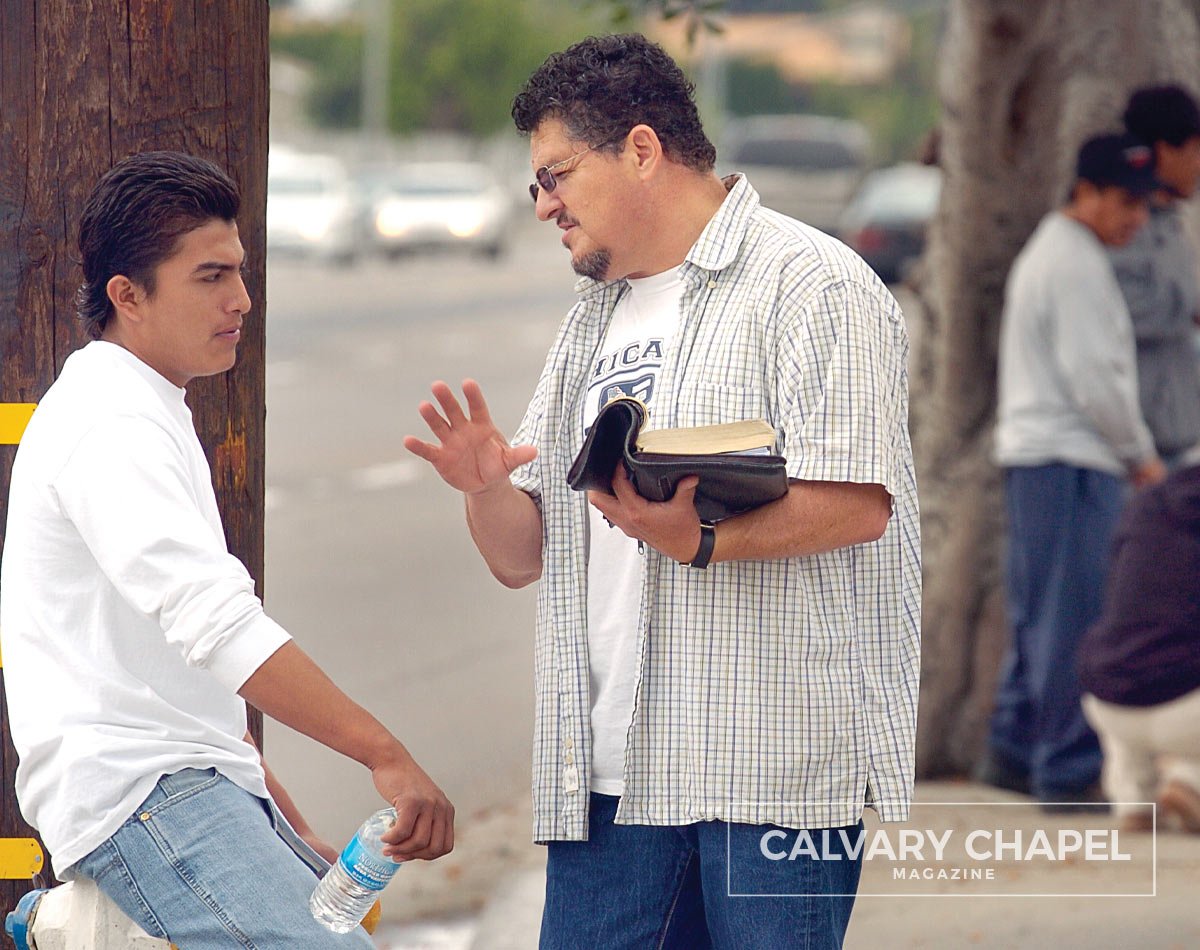Sharing Your Faith
Sharing Your Faith—Spreading the Gospel Effectively with Love
Story by Debra Smith
This story first appeared in Fall 2012, in Issue 53 of Calvary Chapel Magazine. The advice from seasoned pastors on how to effectively share our faith is just as timely eight years later.
After Roger Stahlhut finished explaining to his seatmate the Good News about Jesus’ death on the cross to pay for mankind’s sin, he asked if the person would like to commit to following Jesus as Lord and Savior. Then suddenly, the two found that their conversation had become three-way: “What about me? Can I give my life to Jesus, too?” the person sitting behind them on the plane asked, leaning forward. Delightedly, Roger led them both in prayer to begin a relationship with God through Jesus Christ.

Pastor Roger Stahlhut (left) and Pastor Jeff Morris of Calvary Chapel La Grange baptize a young boy in the name of Jesus. Roger has been teaching evangelism in Calvary Chapels for many years.
Evangelism not only ends with prayer, according to Roger, but begins with prayer. “I’m constantly asking God to give me opportunities to share Him with people and to guide me regarding how and when,” Roger testified. “As I strike up conversations and take an interest in people, I’m always trying to bring Jesus into the discussion,” he continued. While the results sometimes appear glorious—as above—and other times dismal, Roger clarified: “There are no failures in evangelism. The only failure is not opening your mouth.” Roger, who formerly pastored Calvary Chapel Open Door in Anaheim, CA, and is now an assistant pastor at Calvary Chapel Downey, CA, also trains believers in evangelism. “Take your eyes off yourself and your insecurity,” he tells anyone hesitant regarding sharing Christ. “If you genuinely love people, you must tell them.” In daily interactions, Roger continued, “I try to find transitions into the Gospel. If someone wears a symbol on a necklace, has a tattoo, wears a shirt with an emblem or slogan, I ask if it has any meaning. In the ensuing conversation, there’s frequently opportunity to ask if the person knows Jesus or has any personal religious faith. If the answer is yes, I ask what it is and how they came to hold it. That bridges into opportunity for me to share my testimony—briefly—and the Gospel.”

A man shares his faith with a group of young men in Nepal. “I’m constantly asking God to give me opportunities to share Him with people and to guide me regarding how and when,” said Roger Stahlhut, assistant pastor at Calvary Chapel Downey, CA.
While conversing, Roger advised, “Ask lots of questions. Engage people; don’t talk ‘at’ them. Listen and respect what they say. Don’t ever push people or force Jesus on anybody. Our responsibility is simply to share Christ in the power of the Holy Spirit and leave the results up to God; He does the saving. Statistics say people hear the Gospel an average of 6.7 times before accepting Christ. If your conversation is the fourth, for example, they might not be ready yet. But at the same time, you must bring them to a point of recognizing their need to make a decision for Christ—and that if they don’t, they’ve rejected Him. That becomes intense; it gets heavy on people’s hearts. It shakes people, both the sharer and the hearer. But sometimes the realization of having rejected Him leads people to surrender to Him later.”

A woman talks with a young man about Jesus in Germany. Roger advises, “Ask lots of questions. Engage people; don’t talk at them. Listen and respect what they say.”
The first time Roger shared the story of Jesus, he recalled, “I was petrified. And nothing really happened after I finished sharing with a small group; nobody was interested.” But that was 1974, and Roger persevered. Today, he is confident God can transform any believer into a competent communicator of Christ. “We are His ambassadors,” he said. “With practice, everyone eventually starts to develop a style of evangelism that fits who God made them to be.” This means which details of the biblical message are shared will vary—both from sharer to sharer and even from conversation to conversation with the same sharer. But the basic content will often sound something like this, Roger explained: “God made us to be in relationship with Him, but we broke that relationship when we chose our will over God’s. The consequence of that bad choice, called sin, is death. But through sending His Son Jesus to die on the cross in our place, for our sins, and rise from the dead, God gives us an opportunity for a restored relationship with Him. We enter this relationship by accepting His forgiveness, repenting of our sin, and making Christ the Lord of our life.”
If a person is resistant, agreed Roger and others, it’s vital not to argue. Steve Coon, an evangelist from Calvary Chapel Costa Mesa, CA, commented, “When you pressure people, they put up defenses.” Suzie Gonzalez of Calvary Chapel Athens, a missionary to Greece, clarified: “It takes discernment sometimes to know whether a person just wants to argue—in that case, don’t do it!—or has specific, honest questions. If someone genuinely wants answers to certain objections or issues, then take them to Scripture. Be willing to take the time for what might be one of the most important conversations of your life.”

A believer takes a man to God’s Word in Israel. “With practice, everyone eventually starts to develop a style of evangelism that fits who God made them to be,” Roger encouraged.
 In his book Everyday Conversations, Eternal Impact: Lessons Learned from Jesus and the Woman at the Well, Pastor Lloyd Pulley of Calvary Chapel Old Bridge, NJ, explores Jesus’ conversation with a woman in John 4. Analyzing Jesus’ words and style, Lloyd reveals the Savior’s example to believers wishing to engage others effectively regarding Christ. “As Christians, we have the great privilege and responsibility of sharing the gospel with those who don’t yet know the Lord,” Lloyd writes. “However, we must make sure that we are sharing it in a way that properly represents our Lord. … Christians sometimes make the wrong impression when attempting to share their faith with others. The way they go about it can sometimes come across as pushy, arrogant, or self-serving.” In contrast, Lloyd continued, “Studying how Jesus approached the Samaritan woman, I saw a perfect example of how we should relate to those around us. His motivation, while born out of a genuine concern for her eternal soul, also revealed a deep respect for her temporal situation.” The remainder of this page is a summary of the concepts in Lloyd’s book, which he communicates through the acronym S.H.A.R.E.:
In his book Everyday Conversations, Eternal Impact: Lessons Learned from Jesus and the Woman at the Well, Pastor Lloyd Pulley of Calvary Chapel Old Bridge, NJ, explores Jesus’ conversation with a woman in John 4. Analyzing Jesus’ words and style, Lloyd reveals the Savior’s example to believers wishing to engage others effectively regarding Christ. “As Christians, we have the great privilege and responsibility of sharing the gospel with those who don’t yet know the Lord,” Lloyd writes. “However, we must make sure that we are sharing it in a way that properly represents our Lord. … Christians sometimes make the wrong impression when attempting to share their faith with others. The way they go about it can sometimes come across as pushy, arrogant, or self-serving.” In contrast, Lloyd continued, “Studying how Jesus approached the Samaritan woman, I saw a perfect example of how we should relate to those around us. His motivation, while born out of a genuine concern for her eternal soul, also revealed a deep respect for her temporal situation.” The remainder of this page is a summary of the concepts in Lloyd’s book, which he communicates through the acronym S.H.A.R.E.:

Two men in the United States talk about a truth from the Bible. Roger emphasized, “Our responsibility is simply to share Christ in the power of the Holy Spirit and leave the results to God.”
SENSITIVE.
Jesus was sensitive to the Spirit’s leading. As a man, Jesus walked in this world fully yielded to the Spirit. He anticipated that the Holy Spirit would guide Him into situations where He would be able to speak to people about their need for a Savior. The most important aspect of sharing our faith with others is that we too would be sensitive to the Holy Spirit’s leading.
Often in our enthusiasm to see a person saved, we feel it our “duty” to share the whole gospel, lead them in the sinner’s prayer, and then begin discipling them—all in one brief encounter. What we fail to understand is that we may not be the full answer for a person. We may only be a piece of the puzzle. It is important that we share God’s Word without compromise, but it is equally important to share it in the power of the Holy Spirit. If we ask Him which piece of the puzzle we are in a person’s life, He will show us how to minister to that person.
When the Spirit leads us, we will not push people—we will not need to. Instead, we will be able to sense whether or not there is an open door.

A woman shares with two girls in Brazil. Lloyd Pulley, senior pastor of Calvary Chapel Old Bridge, wrote about evangelism: “The most important aspect of sharing our faith with others is that we would be sensitive to the Holy Spirit’s leading. … When the Spirit leads us, we will not push people—we will not need to. Instead, we will be able to sense whether or not there is an open door.”
HUMBLE.
Jesus humbly chose to build a bridge. He took the time to cross over the cultural barriers that existed between them. Jesus could have very quickly and easily made her feel spiritually inferior. Yet, He chose to build a bridge instead of building a wall—like we so often do.
Jesus approaches the woman with humility and respect by starting a conversation with her, asking her for a drink. For us, a man speaking to a woman is an ordinary occurrence. But in those days, a Jewish man would never speak to a woman in public, and especially not to an outcast Samaritan woman. By doing this, Jesus broke through the social, religious, and cultural barriers that separated them.
Starting a meaningful conversation, especially with a stranger, is challenging. But building bridges is a necessary part of reaching others for Christ. One must reach across those things that divide people in our society in order to have a real impact. When Jesus asked her for a drink, it was honoring and respectful. In that culture, asking for her help served to elevate her to equality with Him. Because of this, she responded saying, “How is it that You, being a Jew, ask for a drink from me, a Samaritan woman?” (John 4:9).
When I am shopping, I look for ways to connect with people. One time in the produce section of the supermarket, I noticed a woman picking out a particular kind of bean. So I asked her how she cooked them. Her face lit up as though I had named her the greatest chef in the world. She was very excited to tell me how delicious they were when cooked a certain way. As we were discussing beans, I was also praying for an opportunity to take the conversation to the next level. How do you go from beans to Jesus?

In Hungary, a woman joyfully reacts as Pastor Bodi of Calvary Chapel Debrecen reads Scripture to her. “Starting a meaningful conversation, especially with a stranger, is challenging. But building bridges is a necessary part of reaching others for Christ. One must reach across those things that divide people in our society in order to have a real impact,” Pastor Lloyd advised.
AROUSE.
Jesus aroused her interest and curiosity to want to know more. This is very important. We will never convince someone of their need for a Savior unless they want to hear what we have to say. People are drawn to the truth by their desire to know, not our desire to tell.
Once you have broken the ice and found some common ground, the next challenge is to keep the conversation alive and interesting. In John 4:9, the Samaritan woman questions why Jesus, being a Jew, asked her, a Samaritan woman, for a drink. He responded by arousing her interest saying, “If you knew the gift of God, and who it is who says to you, ‘Give Me a drink,’ you would have asked Him, and He would have given you living water” (John 4:10).
Jesus does not really answer the question she posed in verse 9, but He also does not come right out and tell her the good news either. Instead, He intrigued her. Her curiosity about Jeus grew, and she wondered what this “living water” could be. She felt honored that He took the time to give her a riddle to solve, and she was curious to know more. Unless a person acknowledges that there is something lacking in their lives, they will never see the benefit of a personal relationship with Jesus Christ.

Two men discuss the Gospel of Jesus Christ in the United States. “Once you have broken the ice and found some common ground, the next challenge is to keep the conversation alive and interesting,” Pastor Lloyd revealed.
During my bean discussion with the woman in the supermarket, I finally came up with a way to get from beans to Jesus. I asked if the beans could be made for a large group. “What kind of group?” she asked. “Do you have a large family?” I said, “I guess you could say that—about 5,000 in all. But probably only 500 will be coming to our picnic next week. Others will be bringing food too, so we only need enough beans for about 200 at the most.” This piqued her interest, and as we continued to talk, I told her it was for our church family. By this point in our conversation, even if she was predisposed against religion, I haven’t made her feel like I was trying to proselytize her. I really was interested in the bean recipe, although I was more interested in her soul. Since I was only going to go as far as she was willing to go, I “dropped a few dimes” to see her response.
Christians most often cross the line with those they’re speaking to by being insensitive to their comfort level. Whenever I sense that a person does not want to continue the discussion, I thank him or her for their time and move on, knowing that a seed has been planted. If I start pushing the conversation, I will leave a bad taste in their mouths about Christians, Christianity … and yes, Jesus. I can still recall some aggressive Christians who tried to win me to the Lord but caused me to go the other way instead. I thought to myself, I will never be a Christian if it means I have to become like them! If a person is not ready to hear the gospel, you always want to leave them wanting to know more.

A man spends time talking to a woman in a wheelchair in Israel. Pastor Lloyd warns, “Christians most often cross the line with those they’re speaking to by being insensitive to their comfort level. Whenever I sense that a person does not want to continue the discussion, I thank him or her for their time and move on, knowing that a seed has been planted.”
REVEAL.
Jesus revealed the issue of sin. He excused her ignorance but not her sin. At the appropriate time, He addressed it directly. He did not sidestep it. Unless a person recognizes the bondage of their sin, they will never see their need for a Savior.
While some may be too zealous and pushy in sharing their faith, others are too meek. Fear of rejection keeps them from getting to the main point, which is twofold—to reveal sin and to explain the plan of salvation.
Notice how Jesus takes the conversation to the next level. He earned the right to speak frankly to this woman about her sin because He had invested time. He showed her that He really cared about her, so she was willing to listen to what He had to say. By turning to the topic, in John 4:16-18, of her marital history and current immorality, He gently turned the spotlight onto her personal life.
Obviously, five husbands had not been the answer, and there was not much hope for her current relationship either. She had been drinking from the wrong well, and her life was barren as a result. Now she stood before the One who could quench her thirst forever, but there was something she had to deal with first—the issue of sin. In essence, Jesus is saying that the first step in drinking “living water” is to get away from the polluted wells. This is key. A person must realize they are drinking from the wrong well. They need to understand what they are being saved from before they can really appreciate having a Savior. One must acknowledge a Savior and turn from their sin.

An older man pays attention as a younger one shares God’s Word with him. “While some may be too zealous and pushy in sharing their faith, others are too meek. Fear of rejection keeps them from getting to the main point, which is twofold—to reveal sin and to explain the plan of salvation,” related Pastor Lloyd.
EXPLAIN.
Jesus explained the plan of salvation. This encounter is unique in that Jesus met a stranger, and by the end of their conversation, she was a believer. I wish it happened that way all the time. Most often we don’t get to this point in one conversation. But when a person is ready to hear—now here’s the key—we must always be ready to share the plan of salvation with them.
Many times people will try to derail the conversation by instigating a religious argument, as the Samaritan woman’s comments could have easily done. But we can see how Jesus does not deviate from His purpose. He gets right to the heart of the issue in John 4:21-24. From this passage, we see Jesus bring the conversation to the main point. He did not allow this divisive issue to turn the discussion into a debate, but instead shifted the focus to something they could agree upon.
He does not argue with her even though she was clearly wrong. The Samaritans did not worship God in the right way—they had turned away from the Law. They had developed their own religion based on their own thinking. It was more convenient for them to worship in the mountains of Samaria than to travel all the way to Jerusalem. So they built their own altars, choosing what was convenient over what was right. They had created their own god according to their own image, and this was whom they now worshiped—not the God of the Bible.

A man listens to the one he’s witnessing to in Peru. Pastor Lloyd explained that not everyone will become a believer when we share the Gospel. “But when a person is ready to hear—now here’s the key—we must always be ready to share the plan of salvation with them,” he declared.
Jesus has something valuable to teach us in the way He handles this. If He had taken a superior attitude, He would have lost the opportunity to get to the real issue—her salvation. Instead, the issue would have become proving who is right and who is wrong. I love Jesus’ sensitivity. He knows she does not understand, so He sidesteps this trap. Rather than proving His point, He offers her something better.
This is where Christians so often fail. When we begin arguing, we miss the point and lose the opportunity to share the truth with a needy soul. Stay focused. Don’t argue minor things when you have something far greater to offer them—the love of Christ.
All verses above are quoted from the New King James Version, unless otherwise noted.
© 2020 Calvary Chapel Magazine. All rights reserved. Articles or photographs may not be reproduced without the written permission of CCM. All Scripture quotations, unless otherwise indicated, are taken from the New King James Version. Copyright © 1982 by Thomas Nelson, Inc.® Used by permission.

